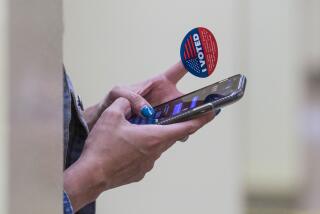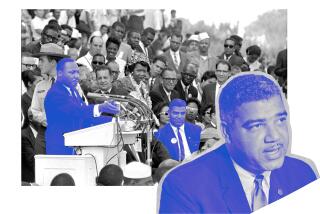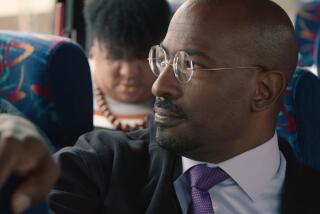A Mission to Bring Democracy
- Share via
BAQUBAH, Iraq — Thirty-five miles north of Baghdad, on a dusty U.S. Army base outside this provincial capital, the officer and the sheik are debating free speech.
Sheik Hanesh Musawi, a robed city councilman from nearby Khan Bani Saad, has come to complain about a recent pro-Saddam Hussein demonstration. “I told my people that the Americans would not allow this,” Musawi says as he sits down with Lt. Col. Oscar J. Hall IV in a spare concrete room on the base.
Hall, a former college football player who commands a tank battalion from Ft. Riley, Kan., listens patiently. “We can stop all the gatherings,” he tells the sheik at last. “But that’s not democracy.... What I want to know is why you didn’t organize a protest the next day.”
Musawi looks horrified. “Baath demonstrations are the work of the devil!” he cries. “You can’t compare that to freedom of speech, sir. Demonstrations are one thing in the U.S. and something totally different here.”
After Musawi departs with a request for help finding a job for a friend, the commander acknowledges that his civics lesson may have been lost.
It wouldn’t be the first time. In between hunting insurgents and dodging roadside bombs, the soldiers of the 2nd Battalion, 34th Armor Regiment have spent the better part of a year laboring over similar lessons in their mission to bring democracy to this corner of Iraq.
Making almost daily visits to city councils, young officers have shown local leaders how to hold public meetings, negotiated a site for a school and, in one town, endured grueling discussions about a rumored bear. They have wrestled with council members they suspect of helping insurgents and others who fear for their lives.
And in the nine months since they were deployed to this area northeast of Baghdad, the soldiers have witnessed the deaths of two comrades and the assassination of a councilman.
“It’s war and it’s nation-building simultaneously.... That’s not easy,” Hall said. “But if we don’t do it, who will?”
Hall, who retains the swagger of a man with enough firepower to level a city, describes war as a “contact sport.” The fighting has kept his troops busy, particularly with regular insurgent attacks on police and army posts.
Even so, the battalion’s 54 tanks usually remain on the base. As Hall readily acknowledged, the mission has changed. “We are here trying to promote another way of life,” the 42-year-old career officer said.
As in many parts of the country, the political culture in this largely rural swath of Diyala province was stunted by decades of Hussein’s authoritarian rule.
“It was like these people were locked in a jail for 30 years,” said George Kazour, a Lebanese American interpreter who has worked with U.S. forces in the area since the U.S.-led invasion in 2003. “They didn’t know how to make decisions because they were never allowed to.”
Changing that -- part of a mission the military calls “Nonlethal Targeting” -- is rarely simple.
When Hall recently visited the majority-Shiite town of Kanan east of Baqubah, soldiers with guns at the ready shut down one lane of traffic on the main highway so the commander and his troops could walk from the Iraqi army post to the building where the city council was meeting.
In a small room decorated with vases of plastic flowers and packed with two dozen local men and U.S. officers, the Iraqis heatedly discussed the town’s meager gasoline ration.
One man said fuel should be reserved for Kanan’s residents. Another argued that such a system would hurt out-of-town bus and taxi drivers who transport residents to their jobs. Yet another wanted to talk about the shortage of kerosene for heating and cooking.
In the middle of the debate, an Iraqi’s cellphone rang with an electronic version of “We Wish You a Merry Christmas.” “I love democracy,” Hall deadpanned.
The commander was less good-natured when the Kanan mayor turned to him with a long explanation of his efforts to secure more money to dig wells.
“You don’t need to tell me,” snapped Hall, who has been trying to make leaders less dependent on the Americans. “You need to tell your fellow council members. And you need to tell them to get out and tell the people what is going on.”
Mayor Mehdi Abdul Karim Nasir, a middle-aged man from a prominent local Shiite family, lowered his eyes sheepishly. “You guys gotta start talking to one another,” Hall concluded sternly. “That’s why you have these meetings.”
The meeting broke up with a quick message from the colonel about the proposed constitution and sighs of relief from U.S. officers, who sweated through the 2 1/2-hour session in heavy flak jackets.
But there had been some success. The council agreed to draw up a list of those who would receive the gasoline.
“They debated an issue that is really important to them ... and they made a decision,” said Capt. Todd Van Orsdel, 36, one of three officers attached to Hall’s battalion who are specially trained in what the Army calls “civil affairs.” “A year ago, these guys wouldn’t have even sat in the same room.”
There have been plenty of less encouraging missions.
Two days after the Kanan meeting, another group of soldiers traveled to the majority- Sunni town of Abarra, only to learn that the council meeting had been canceled for a funeral.
When the soldiers went to a nearby village, they cut short their visit with residents when they got a report of a possible attack on an Iraqi army post and of the discovery of several bombs along a major highway.
“It seems like every day we have things to do, and then something like this happens,” muttered one young sergeant.
By the end of the week, insurgents had blown up a bridge and killed 19 Iraqi soldiers and police officers around Baqubah.
“Sometimes it’s hard for the young soldier who says, ‘I don’t get the message we’re trying to send’ and ‘Why are they shooting at me?’ ” Hall said.
But Hall and many of his officers remain sanguine about their mission. “I tell my soldiers all the time, ‘You know, one day ... you’re going to be sitting there with your son on your leg and you’ll be watching the History Channel. And you’re going to see Operation Iraqi Freedom. And you’re going to see the next democratic government elected. And you’re going to hold that little child on your leg and you’re going to say, ‘Daddy did that.’ ”
More to Read
Sign up for Essential California
The most important California stories and recommendations in your inbox every morning.
You may occasionally receive promotional content from the Los Angeles Times.














